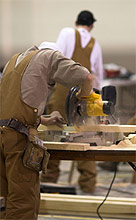Why do you look at the speck of sawdust in someone else's eye and pay no attention to the plank in your own eye? How can you say, "Let me take the speck out of your eye," when all the time there is a plank in your own eye? You hypocrite, first take the plank out of your own eye, and then you will see clearly to remove the speck from the other person's eye (Matthew 7:3-5 TNIV).
Firefighters at a fire station in Nagoya City, Japan, are a little embarrassed this week. Seems they're responsible for burning down a building.
Their own firehouse, as a matter of fact.
Everyone was out answering multiple alarms, it seems - including the firefighter who was cooking dinner for the rest of the crew. In a hurry to answer the call of duty, he apparently forgot to turn off the stove. Ten trucks from other stations responded to put out the fire.
Seiji Hori, spokesperson for the Nagoya City Fire Department, articulated the embarrassment they feel about the incident: "We are an institute that should be in a position to educate people about fire, so we are extremely sorry that such an incident happened."
He added that they might consider ordering out for dinner from now on.
In fairness to those firefighters, they're embarrassed about their mistake. They see the inconsistency. Imagine, though, that they didn't. What would you think if the next time they went out on a call, they berated a homeowner for using a faulty space heater or burning a candle too close to the curtains or overloading an outlet? What would you say? "Physician, heal thyself?" "Practice what you preach?" You'd see the inconsistency, even if those firefighters didn't. "Wait, didn't you burn down your own station with your carelessness?" you might rightfully ask. And you probably wouldn't hear anything they had to say very well, even though they might be right.
A police officer who commits a crime, a doctor whose negligence harms or kills a patient, a judge who takes a bribe, a broker who steals his client's money are people who especially should know better than to do the things they do. They don't see the inconsistency, or more likely they see it and choose to live with it. Like those firefighters in Japan, they should be embarrassed. For whatever reason, they're not. They continue to do things that contradict who they say they are and what they're supposed to be doing. And when everything comes to light, they're left with no credibility. Who trusts a hypocrite, after all?
To point accusatory fingers only at others, though, is to miss the point entirely.
Jesus probably knew first-hand what it was like to have sawdust in his eye. I'm fairly sure that Joseph didn't use safety goggles. So when he wanted to address the human tendency to pass judgment on others while giving ourselves a pass, the sawdust metaphor would have been a natural one. Imagine two carpenters working. One gets a little sawdust in his eye. It hurts, his eye starts tearing, his vision is obscured. His buddy notices that speck of sawdust, points it out, and appoints himself "Official Sawdust Remover." But, he never even mentions his own little problem: he has a whole plank hanging out of his eye. The absurdity of the situation makes the point: the carpenter with the plank needs to deal with own problem before he starts pointing out his buddy's sawdust issues.
It's easier, isn't it? That's the reason, when we're honest, for our tendency to prefer magnifying glasses turned on others to mirrors turned on ourselves. There's something satisfying, gratifying, in a twisted sort of way, about discovering dirt on other people. It's the reason people buy the publications in the grocery store checkout line, and it's the reason other people can look down on them for it. And it's the reason hypocrisy still lives in the church.
That's what Jesus called it, of course: Hypocrisy. I know, it's kind of an ugly word. It's pretending, play-acting, and the only way to eliminate hypocrisy is to end the show and take off the mask, make-up, and costume that we've used to camouflage our sins and pretend to be something we're not. It's to admit that we're only playing at being perfect, and that we're no better than the people at whom we've delighted in pointing fingers.
There are times, of course, when letting something someone has done go by unchallenged can have deadly consequences. Sometimes love demands that we speak up and speak out, that we take someone aside and call him on something we've seen. But when those times come, they should not cause me joy. And if those times seem to come often, then maybe I should ask why I feel compelled to judge others so often. "In the same way you judge others, and with the measure you use," Jesus says, "it will be measured to you" (Matthew 7:2). The truest measure of my attitude toward others is whether or not I would want God to judge me by the standard I'm using.
Who trusts a hypocrite? So by God's grace, we'll pay attention to the planks in our own eyes. By his strength, we'll remove them. By his mercy, we'll receive his forgiveness and healing. And by his Spirit, we'll be able to help others do the same. Not as superiors handing down the verdict on their sins, but as fellow-strugglers who are just as dependent as they are on the love of a faithful God poured out in the One who took our sins on Himself.
When we warn someone about leaving the stove on, let us never forget that we've burned down our share of buildings.











Comments
Have thoughts on this article? Leave a comment